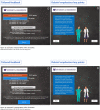TeamSTEPPS online simulation: expanding access to teamwork training for medical students
- PMID: 35515744
- PMCID: PMC8936852
- DOI: 10.1136/bmjstel-2020-000649
TeamSTEPPS online simulation: expanding access to teamwork training for medical students
Abstract
Background: The Team Strategies and Tools to Enhance Performance and Patient Safety (TeamSTEPPS) programme is an evidence-based approach to teamwork training. In-person education is not always feasible for medical student education. The aim of this study was to evaluate the impact of online, interactive TeamSTEPPS simulation versus an in-person simulation on medical students' TeamSTEPPS knowledge and attitudes.
Methods: Fourth-year medical students self-selected into an in-person or online training designed to teach and evaluate teamwork skills. In-person participants received didactic sessions, team-based medical simulations and facilitated debriefing sessions. The online group received an equivalent online didactic session and participated in an interactive software-based simulation with immediate, personalised performance-based feedback and scripted debriefing. Both trainings used three iterations of a case of septic shock, each with increasing medical complexity. Participants completed a demographic survey, a preintervention/postintervention TeamSTEPPS Benchmarks test and a retrospective preintervention/postintervention TeamSTEPPS teamwork attitudes questionnaire. Data were analysed using descriptive statistics and repeated measures analysis of variance.
Results: Thirty-one students (18 in-person, 13 online) completed preintervention/postintervention surveys, tests and questionnaires. Gender, age and exposure to interprofessional education, teamwork training and games were similar between groups. There were no statistical differences in preintervention knowledge or teamwork attitude scores between in-person and online groups. Postintervention knowledge scores increased significantly from baseline (+2.0% p=0.047), and these gains did not differ significantly based on whether participants received in-person versus online training (+1.5% vs +2.9%; p=0.49). Teamwork attitudes scores also showed a statistically significant increase with training (+0.9, p<0.01) with no difference in the effect of training by group (+0.8 vs +1.0; p=0.64).
Conclusions: Graduating medical students who received in-person and online teamwork training showed similar increases in TeamSTEPPS knowledge and attitudes. Online simulations may be used to teach and reinforce team communication skills when in-person, interprofessional simulations are not feasible.
Keywords: interprofessional teams; pediatric simulation; simulation for teamwork training; teamwork training.
© Author(s) (or their employer(s)) 2021. No commercial re-use. See rights and permissions. Published by BMJ.
Conflict of interest statement
Competing interests: None declared.
Figures



References
-
- Umoren RA, Scott PJ, Sweigart L. A comparison of teamwork attitude changes with virtual TeamSTEPPS® simulations in health professional students. J Interprof Educ Prac 2018;10:51–5.
LinkOut - more resources
Full Text Sources
